Sleep Cues from the Babywise Mom, Baby Whisperer, and Healthy Sleep Habits. Sleepy cues that tell you your little one is tired, signs your baby is overtired, and how to get your individual baby sleep cues correct.
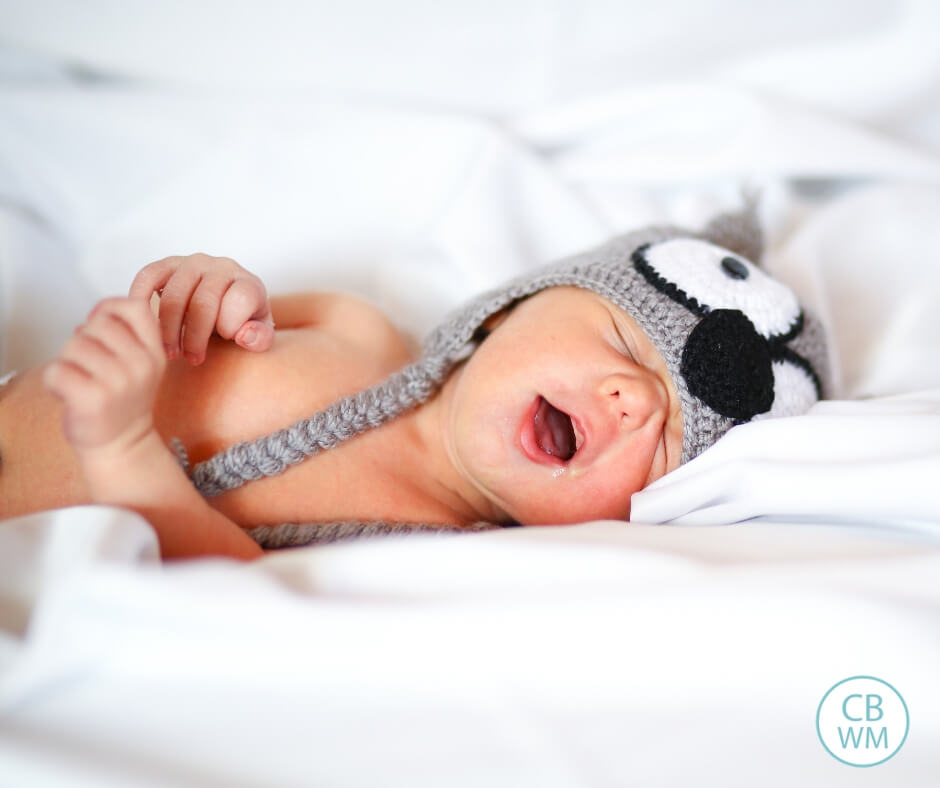
Healthy sleep is vital to the growth and health of a baby; it is also invaluable to the mental health and productivity of the caretaker.
The best way to get the best naps is to pay attention to sleep cues. Baby sleep cues are signs your baby gives that he/she is ready for sleep.
Many new parents try to keep babies awake longer than they should hoping that being up longer will make it so baby sleeps better at night, when in fact sleep begets sleep and staying up too long always backfires.
When the average person thinks of signs of sleepiness, they think of a lot of yawning, rubbing of eyes, and getting droopy-eyed. We may picture a person starting to nod off. Unfortunately, a baby’s sleep cues are not limited to that simple list.
Sleep cues are more complicated than that.
There is a long list of many potential sleep cues. What is a sleep cue for one baby is insignificant for the next.
To make things even more interesting and complicated, your baby’s sleep cues can change over time, so the definite sleep cues from a month ago can lead you astray today. You may even find your baby has no discernible cues.
Watching for sleep cues is a very helpful way to know when your baby is ready for a nap. This is vital for understanding when baby should optimally go down for a nap.
A sleep cue is something your baby does that indicates he/she is tired and ready to go to sleep.
If you are lucky, your baby will give you consistent cues to let you know when it is time to go down for a nap.
Some babies and moms are so efficient at communicating these cues with each other that there is no need for a clock. For others, the clock/cue combo does wonders.
Let me reiterate the importance of getting the waketime length correct. Your baby will sleep much better if you get her down on time.
Your baby will also cry least (if you are doing cry it out or sleep training of any type–see my favorite no-cry sleep training method here) if you get down at the right time.
Let’s discuss common sleep cues so you can help your infant sleep well.
How to Know if Baby is Tired
Figuring these cues out will really help you get naps down right. Getting that nap timing down for your little one is vital for great naps. There are several posts on the subject if you need more convincing: see An Easy Short Nap Fix That Works.
Here is a list of some sample cues.
- Fussiness. This was my son’s cue. He’d start to get fussy, I’d look at the clock, and sure enough. It was time for a nap.
- Yawning. This was my daughter’s nap cue for a while. For her, it was one nap. Some moms have said three yawns.
- Red around the eyes. My son also had this for a while.
- Rubbing eyes. My daughter has recently picked this one up.
- Naughtiness. This is more a cue for older children or even older babies. My son now will get naughty if he is overdue for sleep.
- Hard to please. Some babies get impossible to entertain. This would be similar to fussiness, though baby might not be fussy.
It is wise to combine these baby cues with the clock. Take your baby’s age into account and also normal naptime.
Around 2 months old, Kaitlyn dropped all cues all together until she was about 11 months old, so I had to go by the clock only for a long time.
Sleepy Cues vs. Hunger Cues
It can be hard to know for sure if your baby is having hunger cues or sleepy cues. Check out my post on hunger cues and compare it to the cues in this post to get a good idea.
Sleep Cues of My Babies
Brayden: Brayden’s sleep cue was easy and ever the same: fussiness. Newborn on up, it was fussiness. As he grew into a toddler, this moved into him being naughty when he was tired. He still at age five gets emotionally upset when he is tired.
Kaitlyn: Kaitlyn was one of those “cue-less” babies. At about two months, she dropped her signs. She was about a year before she started giving me hints again. So I had to judge her waketime on her naps. If the naps were good, I knew her waketime was right. Even today, she doesn’t show any sign of needing sleep until she is very overly tired. She will be up 3 hours past nap time before any classic cue comes out. We have pretty much always had to be clock people with Kaitlyn’s naps.
McKenna: McKenna had a classic “seven-mile stare” described by Hogg. She would star off into space when she was ready for a nap. Now at 19 months, if she is ready for a nap, she comes looking for me and wants to sit in my lap.
Brinley: It took me until Brinley was about 20 weeks old to realize she had nap cues. I hadn’t really ever searched for them because my other kids did not keep nap cues long. At 20 weeks, she started to get a bit jabbery–jabbery in a frustrated or discontented sort of way. It was so great because rather than watching the clock, I just paid attention to her.
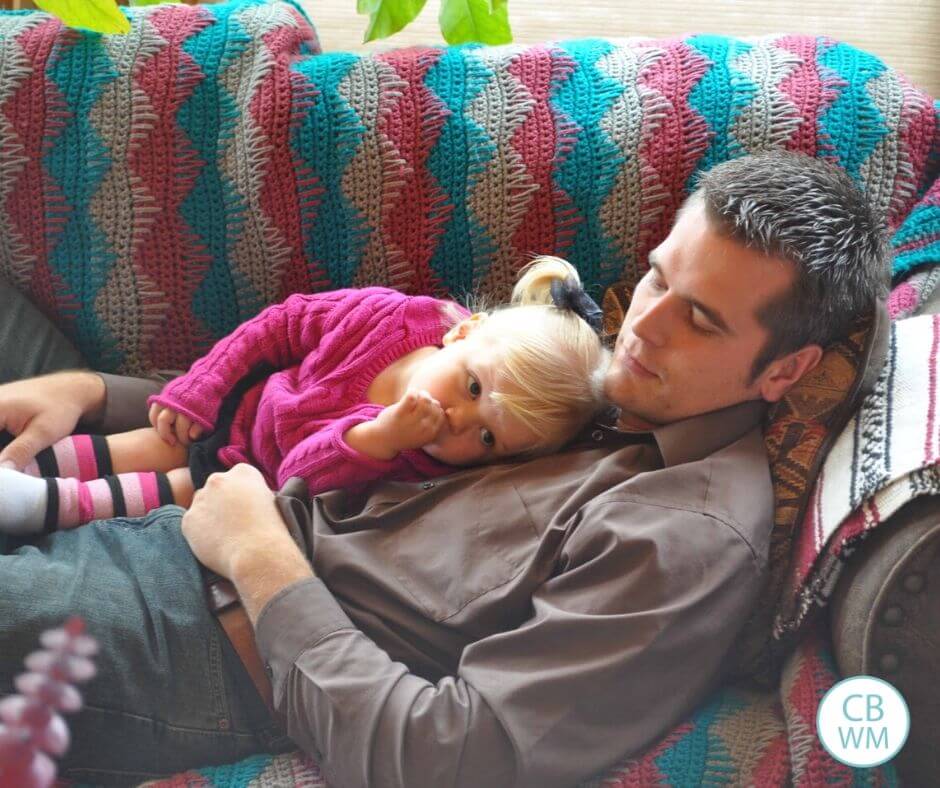
Sleep Cues from the Baby Whisperer
Here are 16 cues from Tracy Hogg in Secrets of the Baby Whisperer that show your baby is ready to go to sleep (found on page 177). I have also listed additional cues found in The Baby Whisperer Solves All Your Problems (page 181).
As you consult this list, pay attention to what actually works for your baby and what does not.
I found for some of my children, a yawn was a cue that it was time for a nap. For others, it was a cue that I had missed the perfect window.
Take notes (you can purchase my comprehensive Book of Logs here to help you take perfect notes and get things right). Study your notes and see what works for baby and what does not.
When you take notes, you can look at the overview and see if baby actually sleeps well when you follow the cue you are following.
If baby does not sleep well, try looking for a different cue. Figuring out baby’s sleep is very much a process that works well with the scientific method closely followed.

- Yawning.
- Fussing.
- Fidgeting.
- Opening eyes wide.
- Making sounds like a creaking door.
- Squeaking.
- Turning head from objects or people.
- Burying face in your chest.
- Involuntary movements with arms and legs.
- Rubbing eyes.
- Pulling at ears.
- Scratching face.
- Less coordination.
- Lose interest in toys.
- Arching back and leaning backward.
- Falling while walking or bumping into things.
This list moves from younger baby up through older baby. If you have a newborn, look at the top portion of the list. Work your way down to consult the list as your baby gets older.
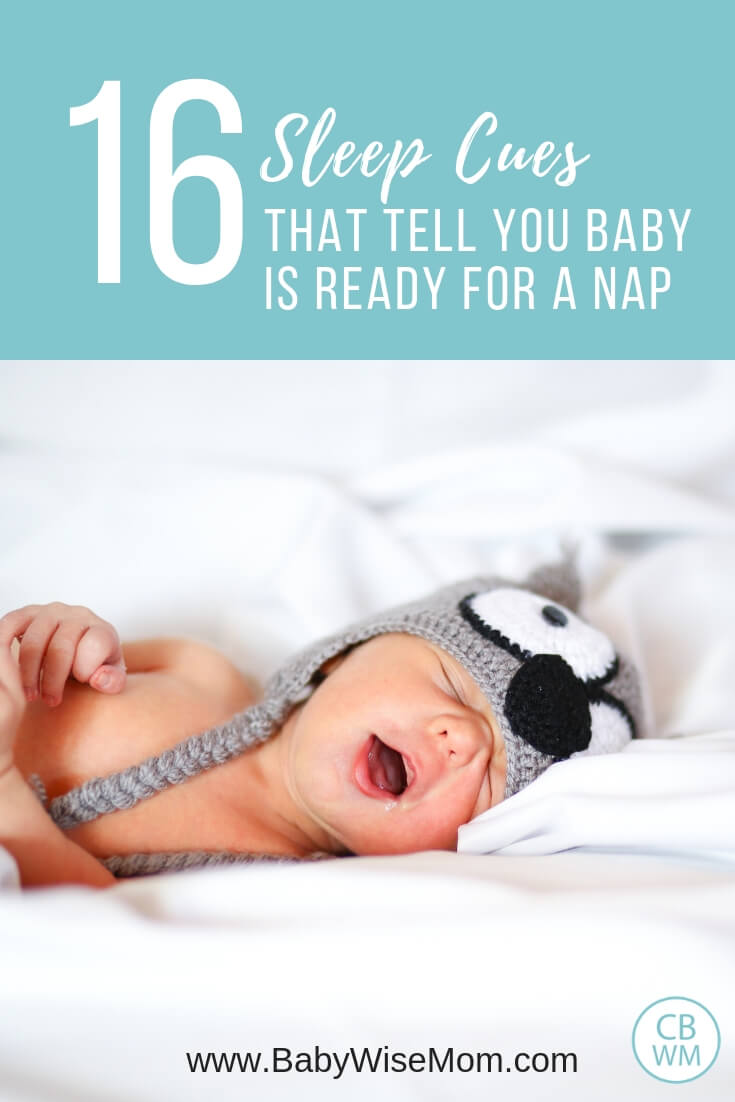
Sleep Cues Found in Healthy Sleep Habits, Happy Child
a baby will not display every sleep cue on a list. Also, your baby might have her own unique cue not included on any list, but my guess is among these three, you should be able to find what your baby displays. This list is found on page 63 and page 71 in Healthy Sleep Habits, Happy Child:
- Decreased activity
- Slower motions
- Less vocal
- Sucking is weaker or slower
- Quieter
- Calmer
- Appears disinterested
- Eyes less focused
- Eyelids drooping
- Yawning
- Less social (smiling less and a lack of engaging you)
The above list is a list of signs your baby is ready to go to sleep. Now for a list of cues that signal your child is overly tired:
- Fussing
- Rubbing eyes
- Irritable
- Cranky
If you study the three sections closely, you will notice there are things Hogg and I list as cues that Weissbluth lists as over-tired cues.
You will also notice Hogg says that baby will get fidgety while Weissbluth says baby moves less.
So what is true?
Well, that depends on the baby.
Welcome to baby life! Your job is to figure out where your baby falls in these ideas.

Signs Baby is Overtired
Some of the above cues are helpful to show you that baby is ready for a nap. Some of them might mean “oops…this waketime was too long. Baby should have gone down sooner” for your baby.
Below are some cues that for most babies mean you let waketime length go on too long. Again, some might be a sleep cue for one baby and too late for another, but I would say that in general, these are too late for your average baby:
- Fussiness/crankiness/irritability: Many people erroneously wait for a baby to be very fussy before considering that baby might be tired and ready for a nap. Extreme fussiness is typically a sign that baby is way over tired and you missed the ideal time to put baby down for a nap. Some babies might have some minor fussiness as a legitimate cue, which is why it is included in the list above, but most of the time for most babies, fussiness actually means “too late.”
- Eye rubbing or drooping: If your baby is rubbing his/her eyes, it is probably beyond the ideal time to start nap time. Also, once you are beyond the super-sleepy newborn stage, eye-drooping is akin to fussiness. Baby needed to be in that crib sooner.
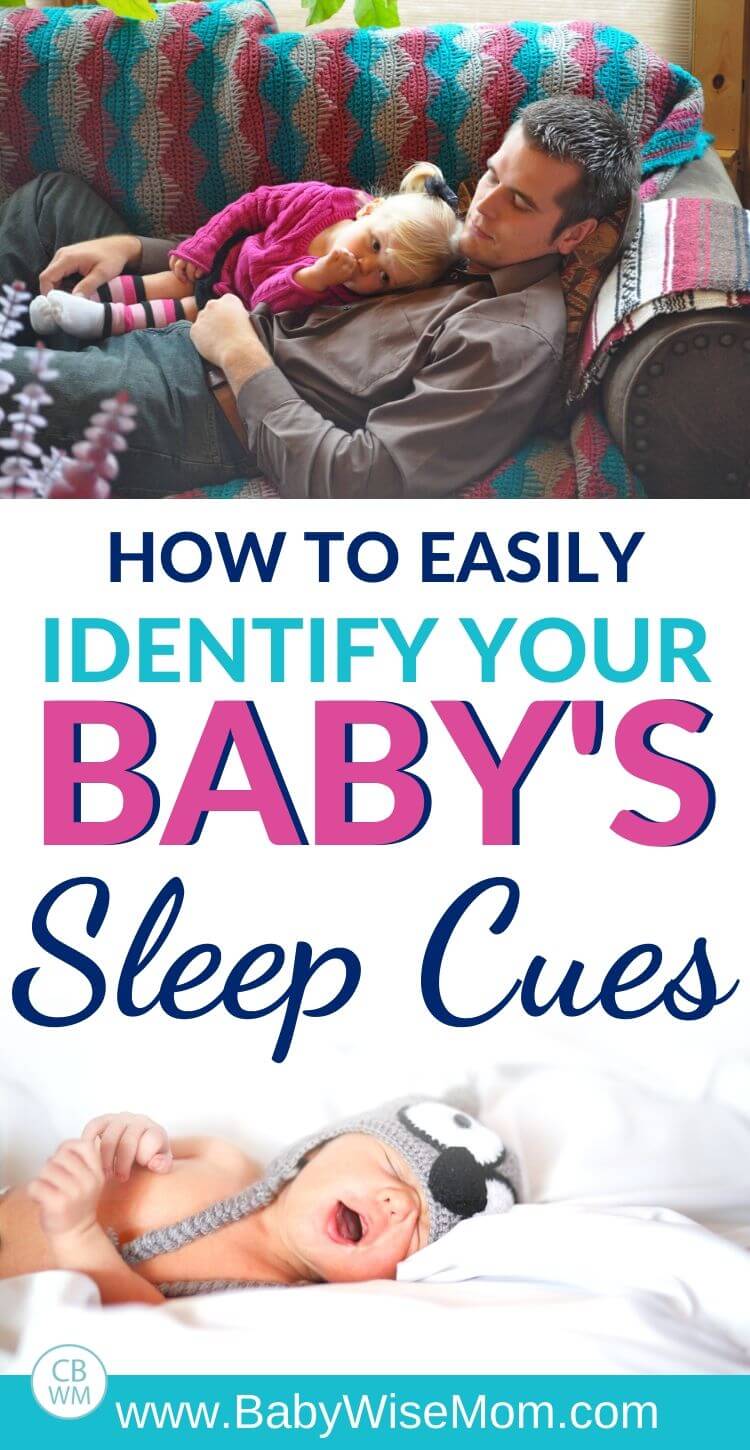
Tips to Identify Your Baby’s Sleep Cues
Now that you have a nice master list of possible sleep cues and what is a too-late cue, let’s discuss how you can tell what is a sleep cue for your baby:
- Pay close attention to baby: The first thing you need to do is pay close attention to your baby. What is your baby’s individual behavior pattern during awake time? Most babies will play and be interactive and then start to drift from being active toward stillness. After stillness comes fussiness. Note the things from the list your baby does, then decide which cue might be the best indicator that baby is ready for a nap. Some babies might be at the first yawn, while others are at the third yawn. For others, the yawn means nothing. Take note of which cues your baby displays and then make a guess at what might be your baby’s cue.
- Know common optimal waketime lengths for your baby’s age: You want to couple your baby’s sleep cue list with the common optimal waketime length for babies. Most babies will fit into a tight range of how long he/she should be awake before the next nap should start. Be aware of what is normal and judge baby’s sleep cues in the context of time range. Remember that waketime length includes feeding time.
- Take notes: You cannot trust your memory in these days of problem solving. I can’t tell you how many times I thought something was the best sleep cue when reflecting on my memory of it, but when I analyzed my notes, I realized I was off. Take notes of sleep cues and waketime length. Note the cues displayed, how long baby was awake, and how the nap went.
- Apply the scientific method: Now that you know what to look for and about how long baby should be awake, you are prepared to take notes and apply the scientific method to figure out sleep cues. I promise this is easier than it might seem. You know your question–what are my baby’s sleep cues? You have done your research by reading this and other linked posts. Next you make a guess. Based on what you have observed so far, what do you guess baby’s sleep cues to be? For the next few naps, try starting nap after you see that/those cues. Take notes in your logs. Note what cues you used and how the nap went. If things are going well, stick with it. If they aren’t, decide what to tweak. Continue tweaking until you get it right.
- Adjust as needed: My babies changed sleep cues as they got older. Sometimes they even had periods of no cue at all and I had to go completely off waketime length. I had to adjust what cues I went by as they got older. Be sure you adjust as baby changes.
Conclusion
As you work on the sleep cues, have patience with yourself. There will be naps you make a guess as to what the best sleep cue is and you get it way wrong. Forgive yourself. You are only human and doing your best. Keep working at it and things will become more natural for you. You will get to know each of your babies better as individuals and know how to respond to their distinct needs. Sleep cues are a great starting point for achieving great naps. The effort can be exhausting and frustrating at times, but the effort is well worth it.
Frequently Asked Questions about Baby Sleep Cues
- ProudMum said…
This is great blog. I think all problem of my baby naps lie in waketime. 1. when u say stay happily , it means if I play with her, she will create fuss? but I think she starts to play happily. I am so confused about her nap cues, which I think getting fussy. around 6 or 7 she wakes up for first feed then stay awake at bed for one hour and then sleep and she awake around 9:15. she sleep at night at 8:15. after 12 hrs sleep still she needs nap after 1 hour? As I put her down after 2 hrs and my whole days r bad abd baby is cranky. Do babies cry if I put them earlier for nap? she just sleeps for 35 mins for napand cries all day
Plowmanators said…
1. Not totally. Some babies will fuss if they are bored with what is going on or if it is simply too much. But yes, after 12 hours of sleep, she still needs a nap after 1 hour. That will eventually lengthen out, but is totally normal right now.2 hours is most likely too long for her at this age. If it is too early, they usually play. If she is waking after 35 minutes, she most likely needs a shorter waketime. Try 1 hour waketimes and see how it goes. - Todd and Noelle: I stumbled across your blog and have really appreciated several of your posts – thanks!My 5 month old son usually has waketimes of about 1.5 hours, except in the evening when he may be up 2+ hours before his 7 p.m. bedtime. When he awakes early from a nap and will not go back to sleep, what advice do you have on the following waketime? If I try to keep him up until I would when he has taken a longer nap, he sometimes seems too overtired to fall asleep on his own. However, if I put him down after he has been awake 1.5 hours, the rest of the day is different and I find myself trying to squeeze in another little nap somewhere. Any advice?? He is a really happy baby and so nap cues, like fussiness, sometimes aren’t present. Thank you!~N.F.
Plowmanators: Noelle,I am glad you have found us! See this post: Waketime When They Wake Early . It is a hard call on exactly what to do in those situations, but that post has my advice on that. My baby also shows no cues (until recently). You have to just keep track of wake times and then the nap that followed. If the nap was at least 1.5 hours, the waketime was good. If not, keep working on it. Different times of day will have different waketime lengths. It will take time to figure it all out, but you will get it. Good luck! - IzzysMama: Is it possible for the first waketime of the day to go from 30 min. to 1.5 hours in just a couple of weeks? I thought things progressed slower then that. Our first nap was always the best. Now the last couple of weeks she is staying awake in her crib talking and then waking after 45 min. She always seems to fall asleep about 1.5 hours from when she first woke up. I have tried to increase wake times gradually but it is always the same. I’m following yawns, but maybe not enough yawns? Needless to say when this first nap doesn’t go well the rest of the day is all sorts of fun. 🙂 Has anyone experienced a change this fast?
Plowmanators: Sounds fast to me. I guess anything is possible, but I would be more inclined to think she is busy working on some skill rather than needing to extend waktime by one hour. She is so excited by whatever it is she is doing she is doing that instead of sleeping, then getting herself overly tired.When you have extended waktime, how large of increments have you done? I have found often Kaitlyn only goes up by 5 minutes at a time. That makes a difference for her. - stephanie: I am transitioning my 5.5 month old to two naps a day and need help. His eating schedule is:- 7 am- 11 am- 2 pm- 5 pm- 7 pmThe first morning nap fits well – from 9:15 am – 11 am – so he wakes up and eats. But the afternoon nap is throwing me for a loop. If I put him down at 1 pm, he only sleeps an hour, not enough to get him through to bedtime at 7 pm. Should I hold him off until 1:30 or 2 and feed him right before he goes down? Help please?!?!
Plowmanators: Stephanie,Are you sure he is ready for only two naps? Few are ready as early as 6 months. Most are around 8 months. Between 6-8 months, the third turns into a 45 minute nap (or remains that way if it was already). I would try a shorter waketime after 11. Two hours is likely too long for him at that age and that time of day. Once you get that down and nice and long, you can evaluate if he is really ready to drop that 3rd nap totally.
stephanie: Thank you! You’re right, I probably was rushing him into it – I’ll wait it out and continue the third nap until he’s ready. My daughter went to two naps at 6 months but I think this little boy needs more sleep 🙂 Thank you for your wonderful advice.
Plowmanators: You are welcome. It is funny. I think with our first baby we kind of think we want the naps to continue on, but once we get down to two then one nap we realize life is actually really nice that way and we are anxious for the next child to hurry there. At least that is how I am 🙂 - Amber Wheeler Spatola: Hi. I’m trying to figure out naps with my 2.5 week old. She does great sleeping at night but not so during the day. I try to get her to sleep by walking around in her room but she just cries. If I walk around the house tho she’ll fall asleep. But once I out her in her crib, she wakes up and cries. If I stay holding her, she’ll sleep forever. Maybe I’m waiting too long to put her down; she gets fussy an hour and a half after waking so that’s when I start. Maybe I should be staring earlier?
PlowmanatorsSeptember 28, 2011 at 4:19 AM | EditAmber, Definitely put her down earlier. She should be up less than 60 minutes totally (including feeding). It could be as little as 30-40 minutes. - KJackson213: I am now getting nap cues even after naps. I’m confused because when I wake up in the morning, and I wake up from a nap, I yawn, I rub my eyes, all the same cues as I’m looking for in baby for sleepiness. So I don’t know whether she needs to sleep longer, or whether she’s just doing these cues because she’s waking up. So sometimes I will put her down 30 min after shes woken up and she will SCREAM which she rarely does. Then I will get her back up bc I will then assume she’s not tired, as she never screams for naps. I am afraid that this habit is going to get her thinking that if she screams mommy will come get her. I am really frustrated bc I can’t tell when shes REALLY tired. Also, when my mother n law was over here, she was able to tell me when baby was feeling PAIN vs being tired (she has reflux), and baby would always sleep a full nap. She left and baby’s back to 45 min. Because when shes feeling pain she has some of the same nap cues, like red eyes and rubbing face and fussiness. How did you distinguish between tired and reflux if baby doesn’t yawn? (anymore 🙂 ). She only yawns at night! Any advice would be appreciated. Thanks! I did read the reflux post!
Plowmanators: KJackson, What age is she? Kaitlyn stopped showing cues really young. I don’t remember exactly when. I think it was around 2-3 months old. If your baby doesn’t show cues, you have to go more by time awake and take other clues to figure out optimal waketime length. See this post: Optimal Waketime Lengths and Wake time: Length, Extending, and Calculating. I don’t remember how old your baby is, but it seems she is at least four months? 30 minutes of waketime is definitely too short for a baby any older than two months. As far as distinguishing cries…that is something that just comes with time and observation. Keep a log if you need further help on figuring it out. - Mama Nicole. Thanks so much for this blog….amazing!! My 8 1/2 week old has been having trouble staying asleep for his mid-day nap and his afternoon and evening naps. He will fall asleep and wake up crying within 20-40 minutes of falling asleep. I don’t think he is hungry so what should I do? If I choose to let him CIO how do I do this? How do I know when he just simply won’t fall asleep? I usually go in after a few minutes of ‘whining’ and give him his pacifier and he falls asleep for maybe 10 more minutes and then he cries again….do I just need to leave him and not give him his pacifier?
Plowmanators: Mama Nicole, since he is falling asleep but waking 10 minutes later, I would guess that he is waking for a specific reason other than “can’t transition.” He might have gas pain ,reflux pain, be hungry…but if he is waking back up after 10 minutes, here is a physical issue going on that you will need to figure out and address.
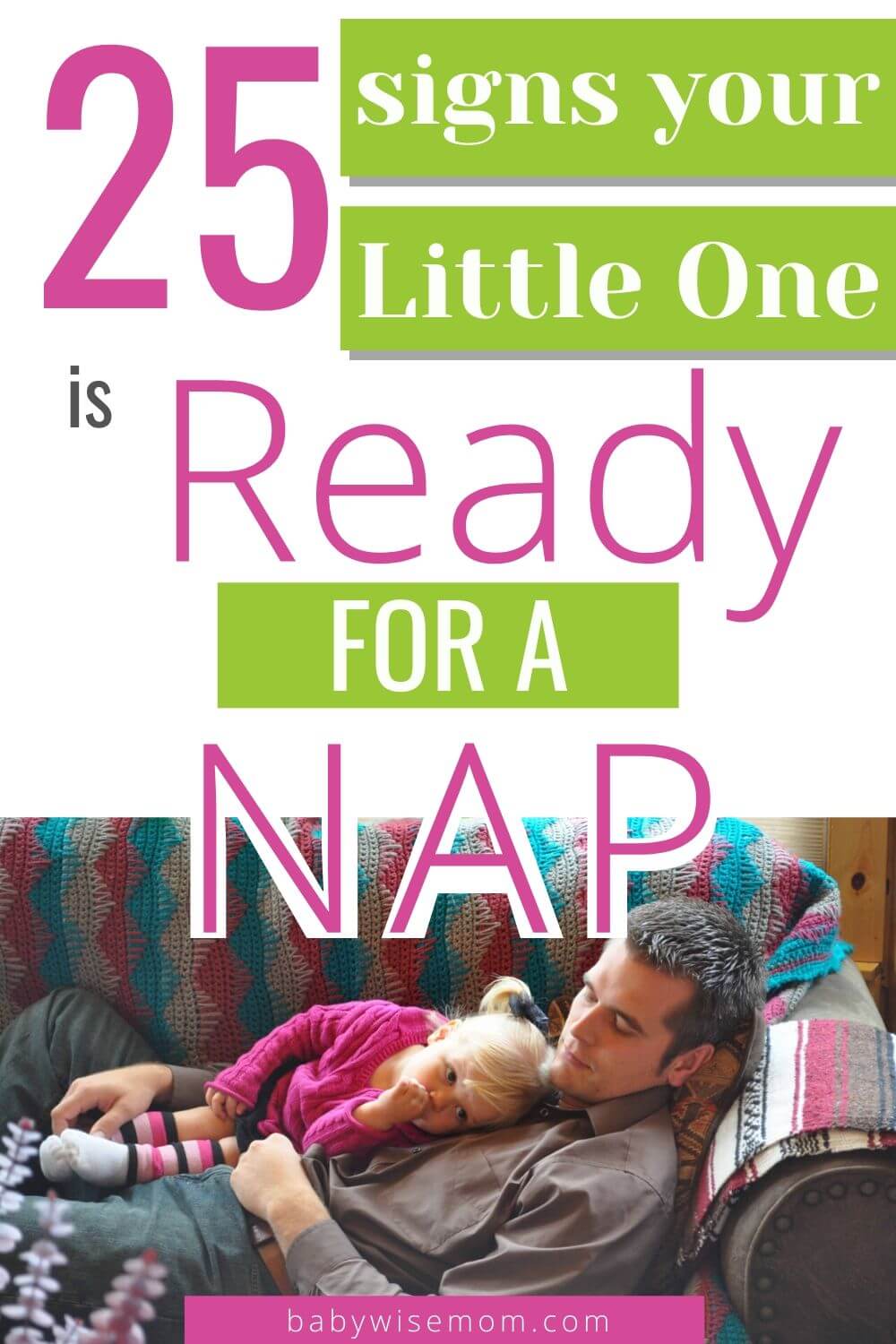
Reader Comments/Advice on Baby Sleep Cues
- Emily said…
That is so funny, when my daughter is tired she’ll pull her ear, fall a lot and cry when it actually didn’t hurt (this is her best cue), or rub eyes. She was right on with my daughter!
Plowmanators said…
Emily, thanks for sharing that. I think it is always good to get a list of cues from other moms so people can be more likely to recognize the cues in their kids. - Alex: from about 8 weeks to 3 months, my son would yawn and stare – easy! then he decided to switch it up and stopped yawning 🙂 these days, at 5.5 months, his sleep cue is some combination of slowing down, tired eyes, and starting to fuss.
- A Wee Irish Family:DD had very few noticeable sleep cues until she was 3.5 months old, then she started to sigh. She’d sigh really deep, and then start to yawn. I had to get her down by the 3rd yawn or the nap was AWFUL! Then she started to rub her right ear and her nose when she got tired. Lately it’s been a combination of ear/nose rubbing, sighing, yawning, and thumb-sucking. (She’s also starting WW26, so her waketimes are a bit shorter than they were a week ago. So if I miss her earlier cues or ignore them, thinking she can stay up longer, she’ll start to get cranky.)
- jrjones5876: My now 21 month old used to start sucking her thumb. Now she just starts whining when she gets sleepy. Sometimes she wants to sit in our laps. My 6 month old will start yawning.
- Dawn: My 8 month old DS will get a bit fussy. That’s when I go change him and get him ready for nap time. Once on the changing table he starts rubbing his eyes. This is his tell tale sign! If he doesn’t eye rub, I may keep him up for a few more minutes of quiet activity/holding
- D & H: Fussiness/crankiness has always been my baby’s sleep cue. Also, he gets slap-happy: the more giggly he is at any little thing, the more tired he is. Now at age 9 months, he will also rub his eyes and wants held or attention from mommy/daddy if he is getting tired.
- Jac: It’s funny how sleep cues can change. For the first 8 weeks of DS life he would yawn and become fussy so I knew it was time for a nap however from 2 months on he became disinterested and stopped smiling and interacting as his nap cue. I was very confused when his cues suddenly changed but very quickly worked it out and we were back on track.
- Kelly Grant: Staring and rubbing her nose. However, she doesn’t have many cues anymore and oh it can make things challenging!
- A Barr: My 5 month old starts sucking her thumb. But sometimes I just go by the clock and it will work better, because the thumb sucking could be a late clue.
- snydsy33: My 4-month-old gets fussy. She used to yawn pretty early on, but now she won’t usually yawn until I’m rocking her and she’s on her way to sleep. She rubs her eyes too, but this is an overtired cue for her, I think.
- Megan Lubbers: My first never really had any sleep cues. My second is pretty easy to read. I have to wait until he’s fussy and doing his sleep pose as I like to call it (he sucks on his right arm and puts his left hand up by his ear), or I wont get a good nap out of him!
- Katherine: My oldest had the best sleep cue–her eyebrows would totally turn red. Funny, right?? I knew instantly that it was time for bed every time. I loved it. My second is completely by the clock. I don’t know until I am laying her down and the thumb goes in.
- Ryan & Amber: My daughter’s almost 14 mos., and she showed the classic sleep cues until about 4/5 months. Since then and even now, she’ll give us a yawn and rub her hair. She gets fussy if she’s overtired, and now when she wants to nap, she will come up to us and lay her head against our legs for a moment .
- Katie {My Paisley Apron}: One of ours is kinda strange so maybe worth sharing – when our baby (now 3.5 months old) gets tired, or tired of an activity, she spits up. Not every time, and it doesn’t always mean naptime right away. But it’s actually kind of reliable in our case. If she’s starting to spit up and naptime could be approaching… it’s definitely naptime!
- Kate: Funny that I just read this…My son (6 mo.) almost always tells me he’s tired as soon as he gets fussy (usually a waketime of about 1.5 hrs). Towards the end of his playtime I often have him do some independent playtime with a few toys. Then as soon as he gets fussy I know he’s ready for a nap. Sure enough this last waketime he did not get fussy at all. He was having a grand time playing with himself. After a while, when I looked at the clock I realized that he had been up for a little over two hours! I put him right down and he fell asleep pretty quickly (usually when I put him down late he screams), BUT woke up after only 40 minutes. I was fortunate that he fell back asleep after only 5 minutes of crying. Often, when I put him down late, that 40 minute power nap gives him the stamina to cry for a while and not go back to sleep.Just a little story to emphasize the importance of keeping a close eye on sleep cues AND the clock!Thanks for your blog!
- Jessica: Before my son could sit up, he would raise his left arm over his eyebrows when he would get tired. We just thought he was being cute for a while; but then we figured out that was his cue. My parents were keeping him one night, and said, “he didn’t seem tired yet, but he kept raising his arm over his eyes and it was really cute!” We told them that WAS the cue! Ha! I have encouraged my other mom friends to look for unique clues also instead of just the fussiness. Now our son is 15 months old, and if he is fussy, we say “are you ready to take a nap or go ‘night-night’ and he runs to his room”.
- djwagaman: I just wanted to add a comment regarding nap cues. I have had an incredibly difficult time figuring out what cue my baby gives when it is time for naptime. By the time she fussed, it was too late, and there never seemed to be a consistant earlier sign. My mother has been telling me over and over how much my daughter moves and wiggles, and I suddenly realized one day that her sleepy cue was no movement. When she lays still and quietly watches you, and it’s close to what I think naptime should be, then I put her down and naptime is much better. I have also found that sometimes she needs to CIO if she is fussy in the middle of a nap (when she doesn’t pick up her head or open her eyes), othertimes, she needs to get up and play a little before she goes back down for the rest of her nap (this is when she picks her head up and is looking around). So basically I wanted to throw my experiences out there for mom’s who are struggling with naptime, and encourage everyone to keep trying, to keep experimenting and know that you will eventually figure naptime out.
- mshave: I just wanted to share a success story as far as nap cues are concerned. I was having a very hard time figuring out my 4 week old son’s nap cues. I picked up “Secrets of the Baby Whisperer” and found the chapter (chapter 6) regarding sleep very helpful. Hogg explains the 3 stages of sleep and I was able to observe my son and actually see him pass through all the stages while falling asleep. Knowing this information has helped me figure out his optimal waketime (30-40 min MAX) and I am able to put him down with hardly no crying at all every time! Praise the Lord! 🙂
- Courtney: For us, usually by the time Ethan gets fussy, he’s overtired. I would definitely look for unique little cues. Ethan will put his head down on our shoulder (if he’s being held) and often babbles quietly (even when not being held). After that he’ll yawn a couple times.. and then he starts to get fussy. Though he’s not as good of a napper as I would like, I do have more success if I get him down at the babbling or yawning stage than the fussy stage.
Related Baby Sleep Posts
- Importance of the First Nap
- Sample Nap Routines
- Sleep Begets Sleep
- Sleep Disruptions You Will Face as a Babywise Mom (and how to deal with them)
- Timing the First Nap
- What is a Sleep Transition (and How Does It Impacts Naps)
- Why Have Naps?
If you need help solving nap problems, get my eBook, The Babywise Mom Nap Guide. This book helps you establish successful naps from birth through the preschool years. You can buy it here and get an instant download.
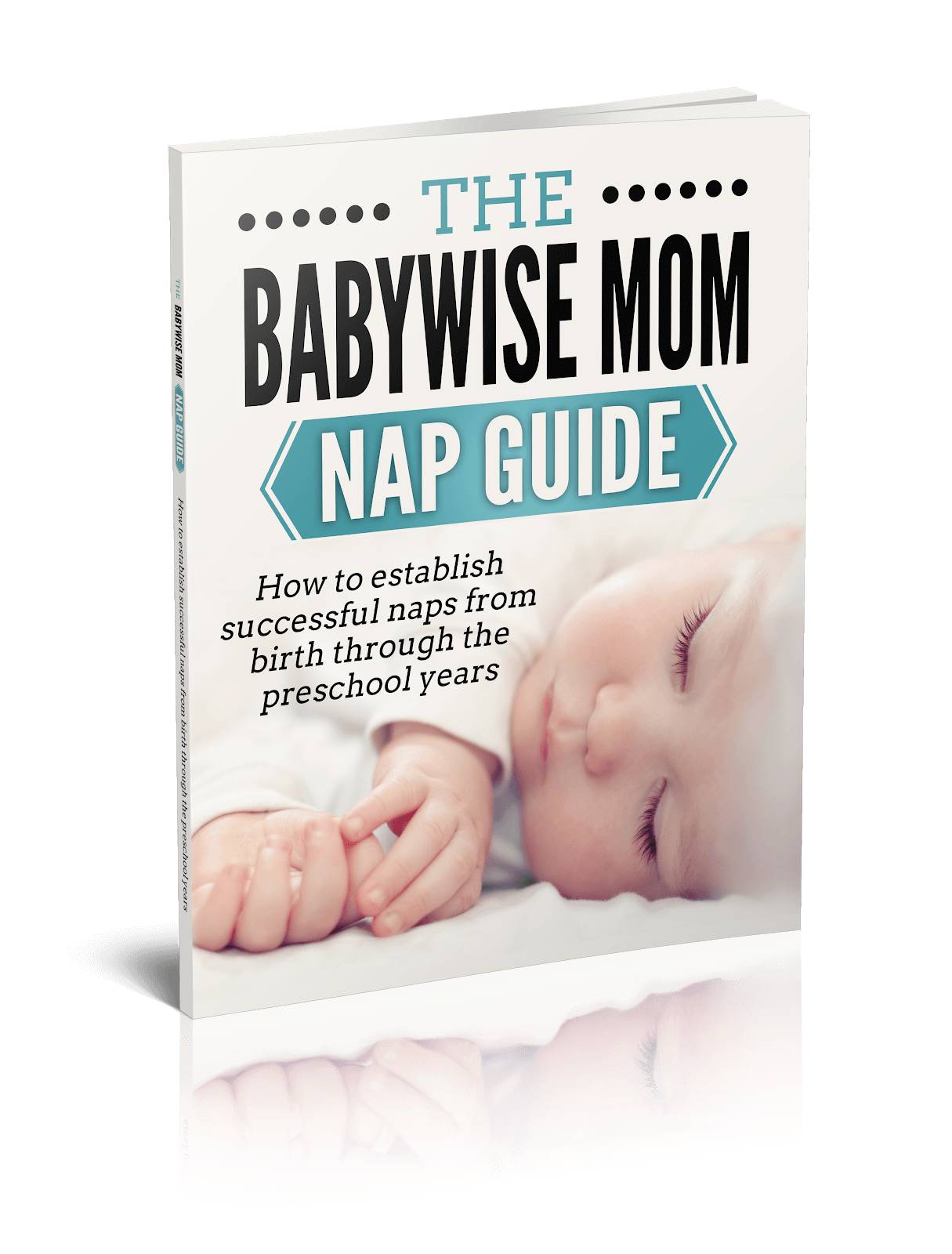
This post originally appeared on this blog October of 2008



